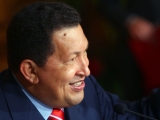Mismanaged Crisis Weakens Chavez
By Samuel Logan for ISN
As water levels continue to fall behind the Guri Dam, responsible for as much as 70 percent of the country's electricity production, Venezuelan President Hugo Chavez continues to make poor decisions that underscore what the opposition has clamored about for years: Government mismanagement has destroyed the country.
The resulting energy crisis has undermined his popularity, which will be tested in September legislative elections.
Since the government announced it would begin rolling blackouts on 12 January, Chavez has struggled to regain solid footing. Due to the disorganized and ultimately failed rolling blackouts enacted in Caracas, Chavez was forced to remove the capital city from nationwide blackout plans and fire his energy minister on 13 January. Soon after, he called Brazilian President Luis Inacio ‘Lula’ da Silva to request technical help, presumably available from a number of qualified engineers that work for the Brazilian energy company, Petrobras.
The request, however, was kept silent compared to his administration's publicly announced decision to hire a external pageCuban technocrat, Ramiro Valdescall_made, to assist with the management of the country's energy sector. Given Valdes' history within the Cuban government as one-time interior minister and long-time member of the Cuban Politburo, the Venezuelan opposition grasped onto the idea that Chavez imported Cuban help not to fix the energy sector but to advise the Venezuelan president on how to best stop hemorrhaging support.
As the opposition gathers steam, rallying around the energy crisis, the president of the external pageVenezuelan Engineer's Association declaredcall_made on 4 February that Valdes' appointment was "disrespectful," adding that the Cuban politician "does not know the situation of the domestic electrical system, because Venezuela's power grid system is different from Cuba's." He also said that his association has been warning Chavez of an impending energy crisis for the past six years.
Chavez's other decisions early in 2010 have also led to a precipitous drip in popularity, which in late 2009 was above 60 percent. It now hovers under 50 percent.
The devaluation of the bolivar fuerte, which doubled government coffers but halved the purchasing power of the average Venezuelan, was met with mixed sentiments, and may lead to as much as 45 percent inflation during 2010. Pro-business supporters cried foul, arguing that Chavez made the change so he would have more money to spend on social programs and increase minimum wage to purchase popular support ahead of the elections.
While not connected to his country's energy problems or currency devaluation, Chavez's decision to remove the popular television channel RCTV from cable on 24 January revealed an authoritarian streak that external pagereminded somecall_made of the idea that the president continues to shroud his authoritarian sentiments in a cloak of democracy.
As the opposition gathers steam, spearheaded by an unorganized yet fervent series of student marches in the capital city and across the country, it would appear that there may be a chance to dilute Chavez's control of the national assembly at the September polls.
So far, however, there is little indication that the student protests will evolve into more than the usual civil unrest and regrettable death and blood shed as these groups clash with Chavez supporters and police and military units ordered to the streets to preserve the peace.
A national oppositional movement has not yet emerged to take advantage of Chavez's bungled administration. Yet as the country marches toward the legislative elections, the dreadfully disorganized opposition may not need to pull itself from its rut of ineffectual poll results. If Chavez continues to mismanage the country's energy crisis, he could give the opposition what it needs most, and through his own revolutionary hubris, cede an unprecedented margin of legislative seats to his detractors.

